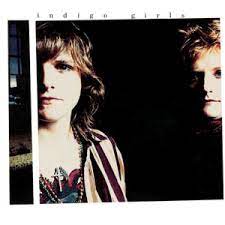June 16, 2025
As Long as There are Stars Above You
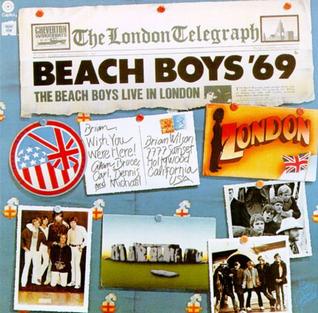
When I was little, any time I spent not wondering just what exactly was going on on Meat Loaf’s Bat Out Hell album, I was likely listening to The Beach Boys, and understanding everything. And I don’t mean it as a rebuke to Brian Wilson’s talent and genius that his music managed to speak to me on a visceral level when I was a toddler—lines like, “There’s a world where I can go/ And tell my secrets to/ In my room.” “Wouldn’t it be nice if we were older, then we wouldn’t have to wait so long?” “I’m getting bugged driving up and down the same old strip” [on my Big Wheel]. The Beach Boys sang songs about being true to your school, about wanting to go home. “And we’ll have fun fun fun til her Daddy takes the t-bird away.” When The Beach Boys sang, I felt like they were telling my story, even though I was landlocked in the middle of the continent and still years away from a driver’s license, with no understanding yet that a t-bird was not, in fact, a kind of bird. Or even what a bushy blonde hairdo looked like.
When I was little, I thought The Beach Boys was this obscure band that only me and my family knew about, their music playing on the boombox we had on our boat. I remember mentioning them once to one of my contemporaries—I was about six at the time—and her correcting me: They were called the BEASTIE boys. But not at my house they weren’t. My very first concert was The Beach Boys live at Copps Coliseum in Hamilton, Ontario, when I was about six years old, though I don’t think Brian Wilson was touring with them by then. When they returned to the pop charts in 1998 with “Kokomo” on the soundtrack from the movie Cocktail, we were ecstatic. I can’t help but think that a small part of the reason I’ve never done drugs is because “Drugs” was always the explanation my dad gave me for the more unlistenable Beach Boys songs, compared to their lush tones and gorgeous harmonies. I mean, what if I did LSD and ended up trapped inside “The Elements: Fire (Mrs. O’Leary’s Cow)”?
The Beach Boys would also make way for my own adolescent zeitgeist, the harmonies of Brian Wilson’s daughters, Wendy and Carnie, along with Chynna Philips, whose songs are as much part of my musical DNA as their parents’, underlining the dadness of it all. So it seems fitting to have passed Father’s Day this year thinking about and listening to Brian Wilson, who died just a few days before. He was the dad’s dad, and his good vibrations will keep on vibrating even now that he’s gone.
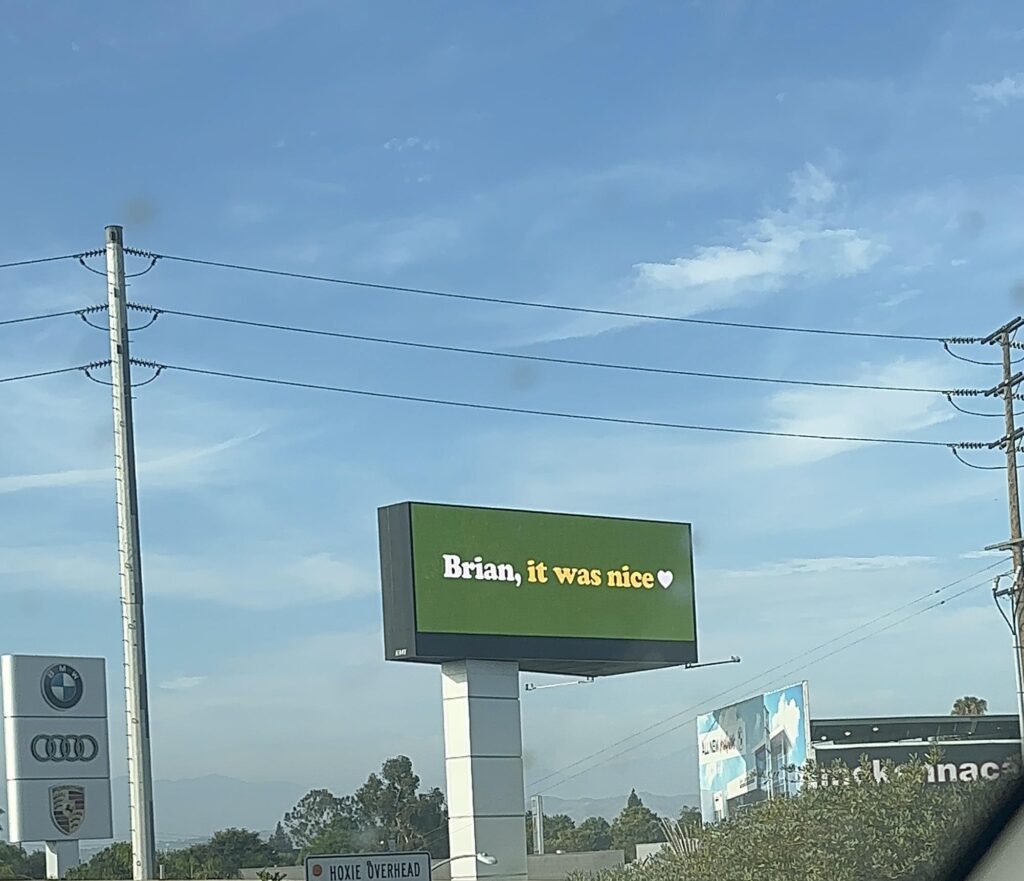
April 8, 2025
25 Years of Dar Williams; or I am the One Who Will Remember Everything
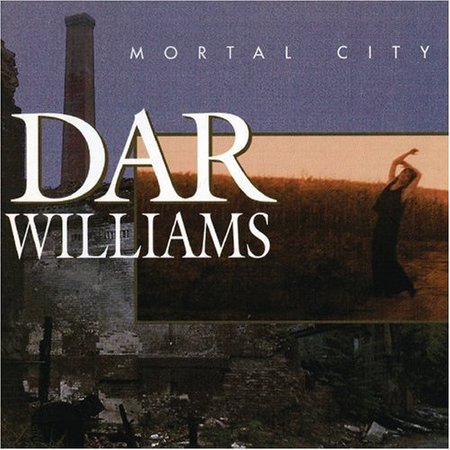
In the 1990s, interesting culture circulated via scenes, and zines, underground movements, and pre-internet online communities, and I didn’t know about any of it. Everything I learned about culture in the 1990s I learned from the movie Reality Bites and from pop-culture phenomena my best friend brought home to us from her all-girls summer camp, so I only knew about Lisa Loeb, smoking, the Gap, Ani DiFranco, and flared jeans, and imagined that was enough to built a life upon. Until the internet arrived in 1997 or so, expanding my universe infinitely, though not quite at the start when the internet was still fundamentally unorganized, the only really worthwhile thing I could think of to do there was to log onto random chat rooms and start talking to strangers.
I can’t remember now how I located these chat rooms, how I would have vetted them to discern if they’d be delivering me a salubrious experience, but I was also 19, and not all that discerning. My username was HitMeBaby1MoreTime, so you can probably tell. I actually didn’t get up to this kind of activity all that often, because meeting strangers on the internet was still perceived as fairly embarrassing in mainstream culture, for good reason too, because every time I did so, I’d end up talking about sex, but sometimes life was boring so what else were we to do?
Anyway, I met someone, a philosophy major who lived in the wilds of Iowa and we fell in love, as you do over text when you’re 19 years old and full of angst and longing, and we confessed such longing, and he mailed me a copy of Still Life With Woodpecker, which I thought was oh so romantic, and we exchanged photographs, and I knew that our love was different and extraordinary, though tried to be cool about it in a Tom Robbins fashion, and I kept listening to the Dave Matthews band’s “Lover Lay Down,” and he started emailing me less, and I started making out with my co-workers, and it was 1999, the year with the greatest soundtrack, and soon our undying love died and that was mostly fine.
But I wouldn’t let it go, and the internet enabled me not to do so (the internet is the opposite of closure) and there were search engines by then, so I could keep tabs on the guy, just to see that was he was out there and what he was up to, and he was friends with this woman who had a blog and wrote about music, in addition to writing stories in which he was a character, and it was from her that I first heard of Dar Williams, who had a song called “Iowa,” which brought it all full circle. And by this time, in addition to search engines, we also had Napster, so I could go listen to that song called “Iowa” myself, and unlike anything by Ani DiFranco, whose songs I never liked as much as much I wanted to like them, that song, and all Dar Williams’ music, felt like it had been directly tapped into my soul.
I’ve never been as sad and yearning as I was when I was in my early 20s, so much unrequited love and undelivered feelings, which swirled around my bloodstream in a crazy-making fashion, but Dar Williams felt like a channel for it. She had a sense of humour too, and I appreciated that, that she didn’t take herself too seriously all the time, but that she also knew the tragedy of wanting, and also of February, which could sometimes be so long that it lasted into March, and people who didn’t know how much I adored them.
I didn’t have Napster at home, only at the office where I was a section editor of our college newspaper, so I bought Dar Williams’ CDs (and of course I bought her CDs; I was always buying CDs; a CD was a piece of the world and I could hold it in my hand). Mortal City was my favourite, and I listened to it over and over in my final year at university, 2001/02, a funny year spent in the shadow of a terrorist attack whose ramifications would still be going on by the time I was entering my late 40s (and beyond?), and also on the cusp of the rest of my life. “Once I had everything, I gave it up/ For the shoulder of your driveway and the words I’ve never felt/ And so for you, I came this far across the tracks/ Ten miles above the limit and with no seatbelt, and I’d do it again.”
In 2002, after going through some real things, I took my CDs away with me to England, a huge book of them, taking up most of the space in my backpack, and a few months after I got there, I fell in love with a boy who loved me back and was my match in all the best ways. On Saturdays, we’d wander around the city centre, and flip through CDs together, even though our tastes weren’t identical. Dar Williams released The Beauty of the Rain in 2003, her first new release since I’d become a fan, and once again it felt like we were in sync, with songs like “Farewell to the Old Me,” and “The Mercy of the Fallen,” and songs of love that was actually requited: “I Have Lost My Dreams” and “The One Who Knows.”
I went to see Dar Williams in Sheffield that year, which was about an hour on the train from Nottingham, where I was living at the time. I can’t remember how I’d even heard about the show, or from where I got the wherewithal to plan the journey—I didn’t have the internet at home or work, and would visit the library a couple of times a week to use it—but maybe it was easier to be proactive before I’d come to take for having access to the world in my pocket via a smartphone. I went to that concert all by myself, and I can’t fathom it now—having no phone and navigating a strange city and taking the train home again in the darkness. My boyfriend didn’t come with me, and it’s possible I didn’t even mind that much, because our lives were not so connected then, I’d been independent enough to move across the world on my own, and my love of Dar Williams had always been something of a solitary pursuit anyway. Apart from the blogger who didn’t know I existed who’d been a friend of my internet boyfriend, I didn’t know anyone else who was a fan.
In 2005, my non-internet boyfriend and I got married, and moved back to Toronto, and I enrolled in Grad School, which, much like my early 20s, was more full of hardship and longing than I’d been hoping for, and Dar Williams released her album, My Better Self, which was the last Dar Williams album I’d get deep enough into that I would know every song, and I listened to it when I was sad about school, which it turned out I wasn’t very good at, though I think it was there that I learned the word “hegemony,” which Dar Williams rhymed with “enemy” on a song on the album. I loved her song “Teen for God” and this was a real Bush-era album, really. I loved her cover of “Comfortably Numb.”
In 2009, I went to see Dar Williams at The Mod Club when she was touring her album “Promised Land,” and my husband came with me, now ashamed for having left me to make my own way to Sheffield back in 2003. It was a fun show, and I was pregnant, just a few months away from becoming a mother. She returned to Toronto in 2011, and I had this idea that I’d gone to see her then too, but I can’t find any evidence that this ever happened. She released “In the Time of the Gods” in 2012, and the stories in her songs had drifted far enough that I couldn’t quite catch them anymore, couldn’t hold them and feel them as viscerally as I’d felt the stories she’d written in her own 20s and released on her albums in the 1990s. I did particularly appreciate one line from her song “I Am the One Who Will Remember Everything,” however, as my own life was wrapped up on the wonder and experiences of my own small child “Oh come over here, kid we’ve got all these books to read,/ With the turtles and frogs, cats and dogs who civilize the centuries,/ And in a world that’s angry, cruel and furious,/ There’s this monkey who’s just curious,/ Floating high above a park with bright balloons.”
Last Saturday I went to see Dar Williams again at Hugh’s Room’s new location on Broadview Avenue. And once again, my husband came with me, in atonement for Sheffield more than 20 years ago now, and we had a great time, and were surprised that almost everyone else in the audience was old. I sat beside a woman called Barb who lives in my hometown, directly across from my high school, and it felt a bit like a Dar Williams song, as did reflecting on how I came to love her music like I do. I listened to those songs, and felt like I was listening to my history, especially “As Cool as I Am” and “Iowa,” which we sang along to at her encouragement, and all the people whom I’d ever been came in on the chorus.
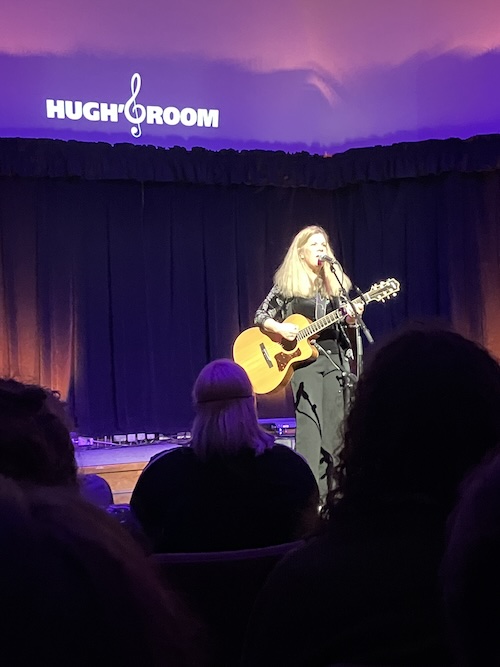
October 16, 2024
Love is a Mixtape
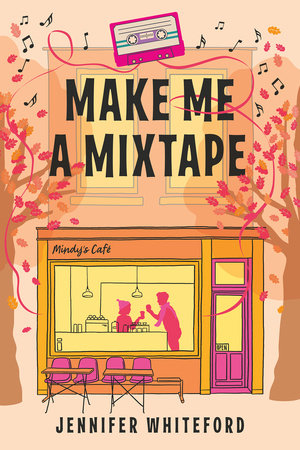
At the turn of the century, almost all of the romantic love I had to give was unrequited, and the only problem with that (in retrospect) was that I never got to realize my dream of having a boyfriend come along to digitize my vast collection of mixed tapes, and then burn them onto CDs. And I suppose I could have done like Dalloway and digitized the mixtapes myself, but I didn’t have my own internet connection back then, let alone a CD burner, and besides, it used to take entire afternoons to download half a song, and burning a CD could take even longer, and the only people with patience for such projects were the kinds of emotionally stunted, technically-inclined dorks that I tended to have crushes on, and none of them ever cared about me enough to do so.
So my trove of mixtapes was lost to time, from “Britt’s Mix 93” to the ska tape our friend Laura made in 1997, that very random tape I made in Grade 10 that went from April Wine’s “I Wouldn’t Want to Lose Your Love” to Alannah Myles’ “Lover of Mine,” and that most iconic Summer of ‘99 tape whose Side B began with Sophie B. Hawkins’ “As I Lay Me Down” to Mariah Carey’s “Always Be My Baby” (and “Angels” by Robbie Williams in there somewhere).
And yes, it’s true that if any of those CD burner-owning boys I’d fancied had ever managed to love me back, the attraction might have petered out around the time they discovered the extent of my affinity for soft rock. The one guy I did go out with during this period didn’t have a CD burner either, but when I gave him a tape that included Heather Nova’s “London Rain (Nothing Heals Me Like You Do),” he was really mean about it, which should have been a red flag—nobody puts a track from the Dawson’s Creek soundtrack in the corner. (Full disclosure: his mixtape for me was really cool, introducing me to music I love to this day, but he was not very nice in the end.)
Mixtapes, for me, in the 1990s, were almost like a scrapbook, compiled in real time. My Sony Sports Walkman was always nearby, and I’d be listening to the tape-in-progress, removing the tape from my deck only to add to it, taping something off a friend’s CD, recording a song off the radio, or from somebody’s parents’ record collection. And then once the tape was complete, it would be titled and dated, a record of time, much of the music not actually contemporary, assembled by chance, but that would become my soundtrack as I made my way through the world, foam headphones ever-present on my ears (at least until I stepped on the headset and broke it, which happened all the time).
My husband never made me a mixtape. We met in 2002, and he’d already embraced the future, a never-to-be-obsolete technology called the minidisc (ha ha) and he brought me on board, for which he still regularly apologizes. He must have made me a mix-minidisc, but I don’t remember what was on it, mostly because there was so much else going on at the time, our separate lives converging, the beginning of forever. In 2005, under the impression of an iconic ad, we each purchased an ipod shuffle (catchphrase: “Life is random”), which was the start of the end of our relationship with physical media (although we still own an entire shelf unit of CDs).
But the ipod shuffle would not be the the end of us sharing music together, on road trips, in the kitchen doing dishes. My husband has a Spotify playlist called “The Kerry List” that is 2 hours and 26 minutes long, specially curated at the intersection of our tastes, and while there’s no Mariah Carey, every single track is one that makes me exclaim, “Tune!” at the opening strains, and to me there is nothing more generous.
Including “London Rain (Nothing Heals Me Like You Do).”
Love is a mixtape, indeed.
June 6, 2024
Message From the Middle
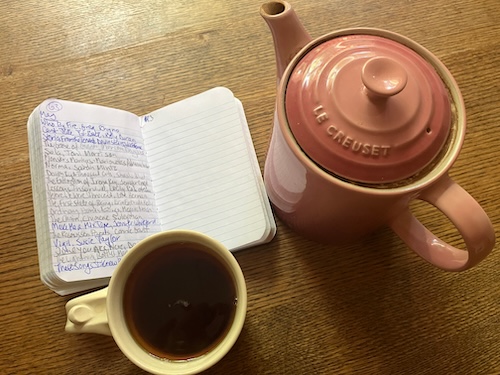
In December 2017, under the influence of Vicki Ziegler, and after much fretting and deliberating (was it really necessary to track my reads? Couldn’t I just read books like a normal person?), I finally started tracking the books I read in a notebook, which turned out to be the very best thing, and this week I reached the milestone of getting to the centre of my book of books. THESE THINGS I KNOW BY HEART, by Erin Brubacher, the 83rd book I’ve read this year, and the 1083rd book I’ve read since December 2017 when I began the notebook with LITTLE FIRES EVERYWHERE, by Celeste Ng. And I am so grateful to have this record, which is useful when anyone asks me what I’ve read lately (like I ever remember?) or I want to take a trip back in time to recall what I was reading on vacation in July 2019 (MIRACLE CREEK, by Angie Kim, PACHINKO, by Min Jin Lee, THE LAST ANNIVERSARY, by Lianne Moriarty), or later that summer when I was reading THE NEED, by Helen Phillips at Kew Beach, or the books that counted down the days before the world broke in March 2020 (POLAR VORTEX, by Shani Mootoo; DISFIGURED, by Amanda Leduc, all my little obsessions (when I reread Madeleine L’Engle’s Austin series in 2019, or 2018 when I read everything by Amy Krouse Rosenthal, falling in love with Sue Miller and reading EVERYTHING), the forgettable books that were forgotten, the UNforgettable books whose reminders make me feel so much (reading THE BURGESS BOYS while eating breakfast in a hotel lobby, how I couldn’t put it down). It’s not about the numbers, though the numbers are interesting too, but instead about the stories in the experience of reading the stories that the notebook has recorded, where over six years has taken me, bookishly and otherwise. And the other half of the notebook, its pages still blank. All that possibility, patiently waiting for each line be filled.
January 19, 2024
Who’s That Girl?, by Mhairi McFarlane
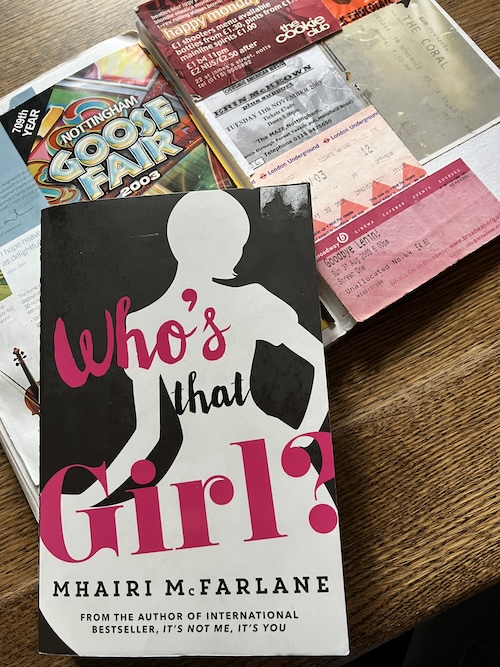
“The Midlands were in-between, just like she was, and the landscape, flat and unassuming, suited her needs. Low and soft, just like a heath, an ideal place for her to land.” —Asking for a Friend
I didn’t know how much it would mean to me to open the pages Mhairi McFarlane’s Who’s That Girl? and be transported back to the city of Nottingham. I haven’t been this excited to be back since I first read Saturday Night, and Sunday Morning, except back then it had only been a handful years since I’d lived there, and now it’s been more than 20. More than 20 years since the last time I walked down Mansfield Road, and then up Sherwood Rise on my way to my little house in Basford. More than 20 years since I’ve been to a Goose Fair, visited the Old Trip to Jerusalem Pub, or contemplated the spiritual distance between West Bridgford and The Meadows. 20 years ago, there wasn’t a burger joint in The Lace Market, but I was so excited when McFarlane’s protagonist, Edie, goes to The Broadway. Her best friend gets divorced and moves into a depressing bachelor pad in Sneinton. She hangs out at the Arboretum. A picnic at Wollaton Hall! I was only disappointed that she doesn’t actually realize her dream of finding ducks to feed on her birthday, because I was very into ducks when I lived in Nottingham, and she wouldn’t have had to search so far to find some.
That, for very personal reasons, I was captivated by this novel about a young woman who slinks into Nottinghamshire with her whole life in shambles (Edie has just attended her work colleagues’ wedding in Harrogate [it becomes Harrogate-gate] and been caught snogging the groom, even though the groom was snogging her, but no matter, she’s on the verge of losing her job as well as her social standing, and her only chance at redemption is coming back to her hometown and ghostwriting the autobiography of a pampered movie star, who is also a Nottingham native) doesn’t mean that this isn’t a story that anyone might enjoy. This is the third novel I’ve read by McFarlane, and I think I love her. She writes romance in which the romance itself takes a backseat to complicated and difficult stories of living through and overcoming trauma, complete with vivid characterization and sparkling humour.
PS A McFarlane has just announced that a sequel to Who’s That Girl? is coming out this year!
November 23, 2022
Postcards to the Future
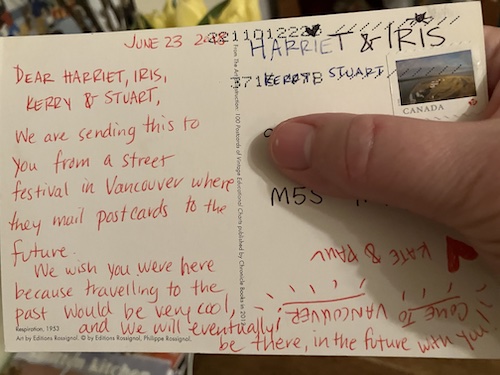
A few weeks ago, we received a postcard from our friends Paul and Kate who live in Vancouver. I will admit that I did not read the note on it very carefully (the image on the front was a diagram of the respiratory system?), but it read something along the lines of that they’d written the card at a street festival “where they mail postcards to the future.”
Which was kind of remarkable, I guess, but then aren’t all postcards letters to the future after all?
The salient part for me, however, was the way the postcard concluded: “…and we will eventually be there, in the future with you!” Because we haven’t seen Kate and Paul since 2019, but this month they’ve finally returned to Ontario for a whirlwind visit, and we’ve been lucky enough to be part of it, which is what I’d so been looking forward to when I received this postcard at the beginning of November.
Tonight we all sat together in my living room eating Thai food, celebrating Stuart’s birthday, Kate and Paul, and our friend Erin, and 3 year-old Clara whom we last saw as a baby, and her little brother Gabriel, who has just learned to climb stairs, and who we’ve been overjoyed to be meeting for the very first time.
“Oh, I got your postcard!” I exclaimed suddenly, remembering. Kate and Paul were both confused. They hadn’t sent us a postcard. “No, you know. The one from the street festival? Where you were sending a message into the future.” They had no idea what I was talking about. “It’s on my fridge!” I insisted. “Here, I’ll show you.”
I went to get it…and realized the most important thing I’d missed when looking at it before. The date at the top: June 23, 2018. The people at the street festival really weren’t kidding about the future thing. I realized too that the note was only signed from Kate and Paul, because Clara and Gabriel didn’t exist then. We hadn’t had a pandemic then. None of us had had any idea of what was coming. And yet.
“…and we will eventually be there in the future with you.” A line that might have hit very differently if this letter had arrived at any other moment during the last few years. But it was a promise.
What are the odds of this very postcard to the future arriving on the cusp of the first time we’ve all been together in so long?
But here we are. I feel so lucky. And looking forward to what other wondrous things the future has in store.
September 23, 2022
My Hilary Mantel
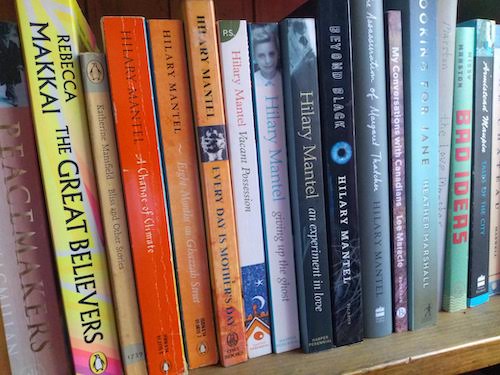
I arrived at Hilary Mantel during what turned out to be the most impressionable and formative parts of my reading life (so far!), during the years after my undergraduate degree when I was living abroad, first in England and then in Japan where my favourite occupation was buying Penguin paperbacks from Wantage Books in Kobe. This was the period where I first started reading favourites like Margaret Drabble, and Joan Didion, and yes, Hilary Mantel, whose own expatriate novels, EIGHT MONTHS ON GHAZZAH STREET and A CHANGE OF CLIMATE inspired the novel I’d write for my Masters thesis a few years later. It was her dark comic novels I loved best though, EVERY DAY IS MOTHER’S DAY and it’s sequel VACANT POSSESSION are horrifying and hilarious (and based on Mantel’s experience as a social worker; I’d also worked for social services while I lived in England and deeply recognized the disturbing realism in these works). You will notice I don’t have her historical works on my shelf—I read WOLF HALL, but (forgive me!) it just didn’t do it for me, which was FINE, because it certainly had enough other readers to go around. I think what I love about Mantel is how wide ranging were her passions and preoccupations over the years, which means there’s a Mantel shelf for every kind of reader and I am so grateful this is mine.
August 3, 2022
Happy Anniversary
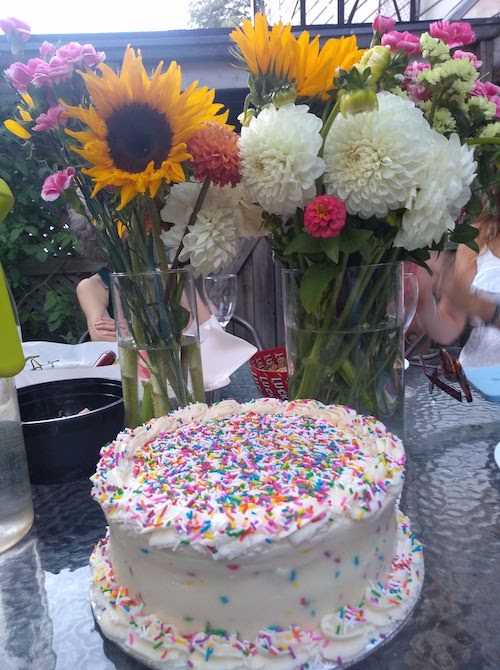
I’ve never observed my abortion anniversary before. I didn’t even know the date, had to look it up (20 years ago on August 1) but when the Supreme Court overthrows Roe Vs Wade on your birthday it’s not the time for business as usual. And so I’m so grateful for my woman friends who showed up in short notice on a holiday weekend to gather with me and commemorate the milestone of twenty years since this pivotal event that gave me my beautiful life. (I’m also grateful for the friends who would have been there and sent their love and support.) I asked my friends to come and bring flowers to add to a bouquet I’d started myself. Gorgeously, my vase overfloweth—and what a thing that my husband did the flower arranging. Twenty years ago, I was so lost and sad, but I am so grateful for the courage and conviction of that young woman who set me on the route to here, and what would I be without the friends who were there for me then and who are there for now (and my family too). What an extraordinary blessing, to get to own your own soul. I’ve said it before, abortion is unfathomable mercy. If that doesn’t resonate with you, I’d love you to get more curious. Happy anniversary to me.
May 20, 2022
Time Machine
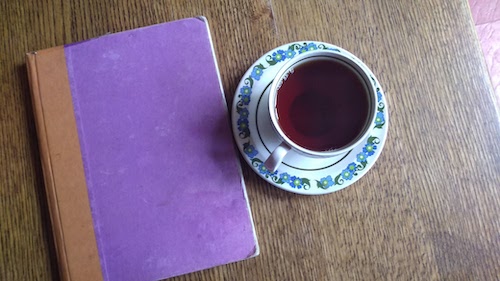
We’re in the midst of re-doing our children’s bedroom, which was last painted in 2008, before we even had children, and the new bunk bed has no clearance underneath, which has required a lot of reorganizing, because all their out-of-season clothes had been stored in plastic bins beneath the old bed. And in the midst of the re-storing, I switched the contents of another plastic bin I had into a cardboard box, and found myself going through my diaries.
I kept diaries for years, though then there came a moment about 15 years ago when I got rid of a lot of them, culling them along with my stacks of photos, yearbooks, scrapbooks. All of it just too much to keep, to carry, in a practical sense, as well as a spiritual one, and there are benefits to not having a basement, a place for boxes of this stuff to live forever,
The past is also on my mind because next week is the 20th anniversary of my university graduation, and I’ve been charged with putting together a photo slideshow for our virtual event. And I’m also currently at work on the early chapters of my next novel, many of which are drawn from life, taking place about 19-20 years ago.
And so it was something to discover this specific diary, which I didn’t even know existed. (I had forgotten too just how detailed my entries were—I wrote so much and so often!). This one runs October 2002-May 2003, capturing the beginning of my relationship with my husband, the months I spent living in a backpackers hostel, working as a temp—initially charged with entering the details of thousands of years-old time sheets into a computer system, the most mindless, boring, pointless occupation imaginable.
And I write about this in my novel, a whole scene in which my character goes to the agency and BEGS for a different job, because she’s going insane from the monotony, and what a thing to find it all outlined in my diary—it really happened. And so much more, I was definitely a ridiculous person, young and unformed, but I was also so brave and strong and resilient, and I am so proud of that young woman who these writing gives me such a direct connection to.
There’s so much incredible writing outlining experiences and emotions I no longer have any recollection of. I’d had an abortion only months before all this, and so that whole experience was very much in process as I was writing. Twenty years later, I’ve made sense of it all, fashioned my own narrative, but it was so raw then, and I didn’t know where I was going, what my story might turn out to be.
In October 2002, I went on a date to the movies with someone I’d met, which was fun and exhilarating, and I wrote in my diary afterwards, “If there is anything I’m sure of not wanting in my life right now, it’s a baby.” What had happened to me, I determined, was “sad and beautiful.” Beautiful, because now I got to have my life.
And then later on the following March, reflecting on the one-year anniversaries of so many pivotal things, and the reality that I could have had a baby then in an alternative reality, an impossible reality. What surprised me about these entries was that *I was so angry* about what I’d been through—and not the abortion, because the abortion had ended the terribleness, though it wasn’t a picnic either.
I wrote: “I don’t regret, but I hate. So full of rage that it ever had to happen at all, that I ever felt so much pain. I am past it now but time’s parallels bring it back to me and it’s so unbearable I cannot bear it. It could drive me crazy to be back there again… I remember grieving in the Fall but I am so absolutely angry now. I broke down…but we’re going to Paris, where I should have gone last July. I am arriving late from a different direction…”
I have no recollection of feeling any of that. Those feelings especially visceral and striking in light on threats to abortion access, something that never even occurred to me in 2002 (when we were all post-feminist, ha ha, remember that?). To have ever been that desperate and not had a way out. What an unimaginable cruelty.
So grateful to this little notebook for a reminder of the person I used to be.
November 29, 2021
Smarter Than the Tricks Played on Your Heart
I’ve spent the last six weeks revising my third novel, which is actually my second novel, written between Mitzi Bytes and Waiting for a Star to Fall. A novel that, like the others, has a soundtrack, but with a twist—this one’s soundtrack is actually good! And how it came to be has been, I think, such an interesting and organic journey.
Beginning as I was brainstorming potential titles, and “Power of Two” by The Indigo Girls kept occurring to me, because my novel is the story of a long friendship and that song’s title, as well as many of the ideas contained within, are just perfectly fitting.
Before my latest draft, the single musical reference in the book had been to another Indigo Girls song, “Love’s Recovery,” misheard lyrics from the CD player in my characters’ kitchen where such music is perpetually playing. (Now there is so much more, and it includes Dar Williams, Tracy Chapman, Ani Di Franco, Lucinda Williams, and an opaque reference to Sarah Harmer’s gorgeous “Lodestar,” which I am OBSESSED with at the moment. It’s a 1990s female singer/songwriter GOLDMINE.)
And just last week as I was writing a new chapter, it occurred to me that my immediate task at that moment was writing a line that expressed the pivotal question from the Indigo Girls’ song “Mystery”: “And if it ever was there and it left/ Does it mean it was never true?”
Not even consciously, I’d been drawing on stories and ideas from their lyrics, songs that I’ve been listening to for almost thirty years.
As a woman who came of age in the 1990s while strumming basic chords on an acoustic guitar and singing in harmony with my best friend, The Indigo Girls have always been important. I’ve seen them live at least twice. Their “Romeo and Juliet” was my only “Romeo and Juliet” for so long, same with “Tangled Up In Blue.” Before I really ever thought very much about queerness, there was still Emily and Amy, who were both gay, we knew, but not a couple, which we hetero teens were always struggling to get our heads around. They were partners, friends. And because of the place and time in which they were coming up in the industry (they were from the American South; they lost out on Best New Artist Grammy Award in 1990 to actual Milli Vanilli) they sang love songs, but couldn’t be explicitly gay about it (kind of like my cousin who always brought a “friend” to Christmas dinner) which sucks, but it also means that growing up, I was privy to the most textured, nuanced and artful portrayals of I’ve always immediately perceived as platonic friendship.
Um, though clearly I was missing several signs, of course. Just what WAS the singer’s hand doing on the subject’s knee “Five miles out of the city limit” after all?
But intense friendship is very physical too, particularly when you’re young, as I expressed in my novel. Lots of bed-sharing and clothes changing, and hugging, and holding hands. Sure, I missed the signs, but so many of them were part of my own experiences of being with my friends. So maybe I was more solipsistic than ignorant.
(Maybe there is no maybe about it.)
How lucky were we to grow up against an Indigo Girls soundtrack, to find a place for ourselves inside their gorgeous harmonies? Their songs like tiny epics that I could use to understand my own connections to other women, to my best friends. How much it managed to articulate all my teenage longings, which seemed somehow inexpressible, beyond understanding, and there it was, all that wonder and amazement, pleasure and pain:
I could go crazy on a night like tonight
When summer’s beginning to give up her fight
And every thought’s a possibility
And the voices are heard but nothing is seen
Why do you spend this time with me
Maybe an equal mystery
